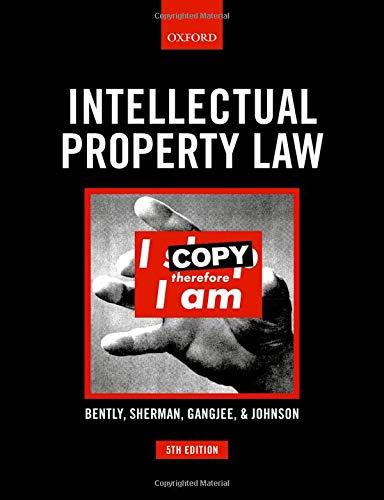Question
3. Regulating Used Car Sales The Ministry of Consumer Relations, headed by the minister, is responsible for regulating used car dealers. The registrar, an employee
3. Regulating Used Car Sales The Ministry of Consumer Relations, headed by the minister, is responsible for regulating used car dealers. The registrar, an employee of the Ministry, has the right to recommend that a tribunal, the Licence Appeal Board, revoke the business licences of dishonest car dealers. A customer of Active Auto Sales, managed by Mr. James, complained to the Ministry that the company had turned back the odometer on a vehicle that it had sold to him. After investigating this complaint, the Ministry determined that turning back odometers was standard practice for this dealership. The company was charged and convicted of fraud, but no charges were laid against Mr. James. Despite this, the registrar recommended to the Board that it revoke Mr. James's licence to sell cars, as well as the licence of his employer, on the grounds that Mr. James had to be involved in the fraudulent activity given his position in the company. The Board holds a hearing to decide whether to accept the registrar's recommendation to revoke the two licences. In addition to arguing that he was unaware of the illegal activities, Mr. James argues that the Board is disqualified from deciding whether to revoke his licence because it is not independent of the Ministry and therefore has an institutional bias. The Consumer Protection Act establishes the Board. It states that the Board will report to the minister of consumer relations; that the chair and members of the Board will not be civil servants; that the premier will appoint the chair and members of the Board; and that the chair will decide which members and how many members will be assigned to each appeal. The Board is required by the statute to follow rules of natural justice, such as giving notice of hearings, hearing evidence, allowing parties to be represented by counsel or agents, permitting cross-examination, and giving written reasons for its decisions. The statute also provides for the Board to summon witnesses, hold pre-hearing conferences, and conduct mediation. The statute allows the Board to make rules of procedure that are approved by the Ministry. It may make practice directions and issue guidelines for hearings without the Ministry's approval. The statute also states that the Board must have regard to any relevant ministry policies when making its decisions. Each year the chair of the Board proposes a budget for the following year. Because the Board reports to the minister, the minister is responsible for approving the Board's budget. The chair hires the Board staff, but the practice is that a human resources officer from the Ministry is involved in the interviews and takes part in making the decisions. The Ministry establishes the salary range for each Board staff member, but the chair decides what salary to offer within that range and whether employees receive a raise each year. The chair cannot terminate the employment of a Board staff member without approval from the Ministry. It is the government's policy that each minister enters into a memorandum of understanding (MOU) with the chair of the Board, governing the relationship between the Board and the Ministry. Each time the minister or the chair changes, a new MOU is to be signed by both parties. The current chair was appointed one year ago, but the minister has not signed a new MOU. Although the Act says that the premier appoints the members, in practice this is done on the recommendation of the minister. The MOU between the minister and the previous Board chair provides that the minister will consult with the chair before deciding which members to recommend for appointment. The members are appointed "at pleasure" for a fixed term of two years. Traditionally, appointment at pleasure means that an employee may be terminated without any notice. The MOU provides that the minister will seek the advice of the chair when deciding whether to reappoint members at the end of their term. However, there is a government policy that members may not be reappointed for more than one two-year term, regardless of the quality of their performance. About 60 percent of the members are appointed on a part-time basis. One of them is a former investigator of the Ministry. The salary levels for the chair and members are established by the government. The current chair was once the director of the legal branch of the Ministry. He left the Ministry three years ago. Before being appointed chair, he was in private practice as a lawyer for one year, then was the director of the Policy Branch of the Ministry of Finance in the provincial government. a. Is there an institutional bias that would prevent the Board from hearing this case? b. Play the role of Mr. James's lawyer and argue that the Board has no jurisdiction to hear this case.
Step by Step Solution
There are 3 Steps involved in it
Step: 1

Get Instant Access to Expert-Tailored Solutions
See step-by-step solutions with expert insights and AI powered tools for academic success
Step: 2

Step: 3

Ace Your Homework with AI
Get the answers you need in no time with our AI-driven, step-by-step assistance
Get Started


